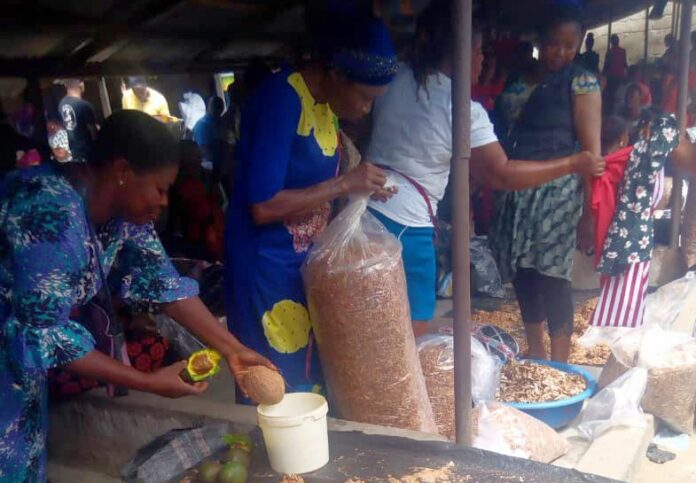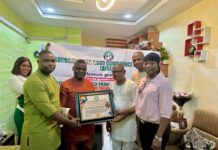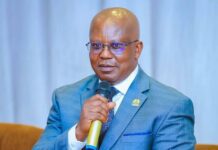Crayfish sellers in Oron seafood market in Oron local government area, Akwa Ibom State.(Photo by Enwono-Abasi Elisha).
By Enwono-Abasi Elisha
It was a sunny afternoon on Sunday, 23rd May at the Oron beach and seafood market, thousands of traders were bargaining, buying and selling. Wheelbarrow pushers, motorcyclists, bus loaders and drivers were competing for space and attention.
The air within the market was hot, polluted and choky, a nightmare of some sort in the afternoon for anyone who is asthmatic. The market was filled to the shore of the river. For once, the crowd in the market would make a visitor ask if Akwa Ibom was no longer a Christian-dominated State. Thousands of traders were in the market that early afternoon while many Churches were still in session.
There was an ongoing rehabilitation of the major road leading to the beach and fish market handled by the Akwa Ibom State Government. The road was constructed in 1912 as a trunk-A road
to ease access to the upland from the beach where dozens of ferries from Cross River State used to berth.
Cars can no longer access the beach market through the road due to the ongoing rehabilitation work. Many cars that must get to the market using alternative sub-ways. There is a chaotic vehicular traffic around the market because cars are parked indiscriminately in any available space, on the road, open fields and private residences.
Buyers in their thousands were manoeuvring their ways down to the beach market on foot, weaving through the thick human and vehicular traffic.
Oron beach and seafood market is said to be the largest fishing beach in West Africa. It extends to Atabong, Enwang, Ebuhu, Asinufot and Ibaka beach which are all landing terminals for fishing ferries in Akwa Ibom State. The Oron seafood market receives the largest number of ferries and traders on seafood.
Many traders from the State complained that the prices of seafood especially crayfish and fish were unnecessarily expensive because the dominant large-scale buyers who are mainly Igbos were controlling market forces against small-scale buyers.
READ : 172 retired primary school teachers in Akwa Ibom have received their gratuity
A crayfish seller at the market, an indigene of Akwa Ibom said they enjoy the price pegs when it is high and as a business woman she would sell to the highest bidder.
“This is business. The prices of crayfish and fishes are not determined by us but by the Igbos. As it is, a bag of crayfish now goes for N75,000.00 which is almost twice the price as of two years ago due to the rise in the prices of things in the market.”
“The price peg favours the Igbos to the detriment of our people because our people who are small-scale buyers cannot compete with them in terms of purchase power. So, sometimes our people cannot buy, and the sellers sell most of the product to the Igbos. Without doubt, fish and crayfish are in surplus in Aba than in Akwa Ibom State.”
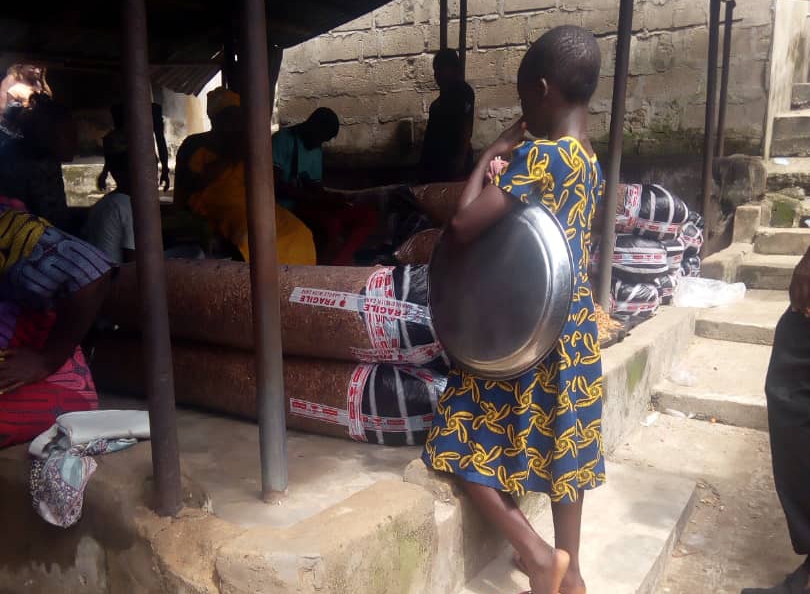 Inside the Oron beach and seafood market in Akwa Ibom State.
Inside the Oron beach and seafood market in Akwa Ibom State.
This assertion was the consensus opinion of all the indigenous traders and buyers this reporter spoke with randomly.
However, the youth leader of Idua Assang community, Mr. Godwin Effiong, said management of the market is in the control of indigenes but the prices of commodities are determined by buying forces.
He said, “it is still a rumour as at this time about who controls the market. Nobody has hijacked the market as speculated. The market is managed and controlled by indigenes of Oro nation not only by Idua Assang community.”
“But the challenge is that, he who has the resources controls the market-force. Therefore, the picture painted that the Igbos have hijacked the market is because they have the money.”
READ MORE :
• CDHR demands N15m compensation each for two Lagosians hit by police bullet
• Suspected yahoo boy arrested in Oleh for killing twin brother for money rituals
A male trader, Mr. Eyo Antigha, an indigene of Oron said Akwa Ibom traders lost control at the market when the market authority agreed to change the market day from Mondays to Sundays as was advanced by the Igbo traders.
“Now, the market is not supposed to be on Sunday, it was originally on Monday. But because the Igbos said they sell their own wares on Monday, market managers had to change the market day to Sundays for them.”
• Tales of Akwa Ibom traders at Oron beach market
Indigenous traders from Akwa Ibom state who said low capital occasioned by lack of access to credit facilities has forced many indigenes out of the business thereby creating opportunities for non -indigenes to takeover the business, lamented that for many years now the federal government has not given them support anymore, none has come from the state either.
Hear one of them, “formerly, the federal government used to give fishing nets and other fishing tools, but for a long time, no such thing has happened.
“Right now, nobody is paddling canoe again. Everybody is using outboard engine. A 25 Horse Powers outboard engine cost about N750,000. Now, look at this environment, who do you think can raise that amount just to buy the engine, talk-less about the boat itself and other fishing equipment in the face of recurring attacks by pirates?”
They said it is mostly the Igbos who come in and buy outboard engines for the indigenous fishermen who in return work for the Igbos. They added that market prices of fish and crayfish can be brought down if the indigenous fishermen and others on the value-chain have access to grants to run the business for themselves.
• Pirates Attacks
Pirate attacks on the sea is have crippled many indigenous seafood traders and have forced many to quit the business.
Many people have left the business after several attacks and vandalization of their boats and fishing equipment. For fear of losing their lives and properties; and lack of capital base to continue in the business, many indigenes have left the fishing business for non-indigenes. It was gathered that most of the few indigenes who are still in fishing business take the risk not on their investments but they are running the business for Igbo investors, just to eke a living.
“You will be surprised that we lose between N10 million and N50 million to pirates every week,” Mr. Godwin Effiong said.
“If a speedboat is worth N2 million and you put about 200 Horse Powers outboard engine worth N2 million with other equipment which cost approximately N1 million, so you are going out to the sea with a N5 million worth of equipment. When you are attacked you lose all that. We record several attacks by pirates in Oron in a week. We lose boats, goods and lives. We lose N10 million to N50 million in a week”, the youth president explained.
• Failed attempts at getting help
Leaders of Assang community said they have made several contacts with the CBN, NGOs and government agencies for financial aid, but none has come.
“Nobody is supporting us. Even when CBN is giving out money for development of agricultural businesses and others, nobody talks about drawing their attention to us in the aquatic business in this part of the country.
“There were attempts by the former executives of this community to access funds to boost the purchasing power of our people. The former regime of leadership in this community visited Bank of Industry and the Ministry of Commerce and Industry in the state. Also, persons in the NDDC were visited for assistance, till now, there is no positive response.”
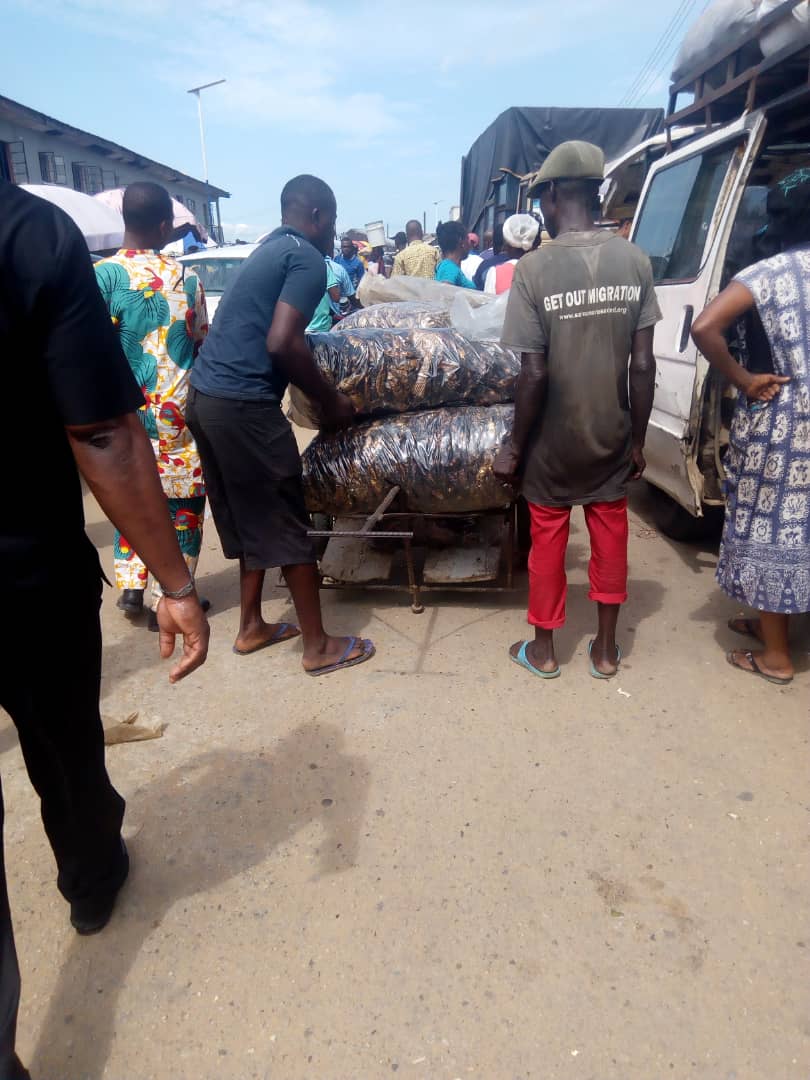 Truck pusher trying to manoeuvre his way through chaotic vehicular traffic inside the Oron beach and seafood market. (Photo by Enwono-Abasi Elisha.
Truck pusher trying to manoeuvre his way through chaotic vehicular traffic inside the Oron beach and seafood market. (Photo by Enwono-Abasi Elisha.
Idua Assang community has not had electricity for eight years now. The community said their source of electricity broke down in February 2012 and they have not been able to preserve their seafood because there is no light.
• Appeal by seafood traders and Idua Assang community
Indigenous traders on seafood at the Oron beach market have appealed to government to give them financial aid. They said access to grants and loans would help boost aquatic business, break monopoly created by non-indigenes, crash market prices of seafood products and its negative impact on the state and nation’s economy.
“As soon as we have needed funding there will be healthy competition, our people will fully be in the business. There will be no special group controlling the prices and the product will be accessible and affordable to ready buyers.
“There will be no monopoly and second – place buying. Everyone will have access to the product from the sellers directly as they land.”
The traders also called on the governments to beef up security on the sea to stem the activities of pirates, loss of lives and fishing equipment.



